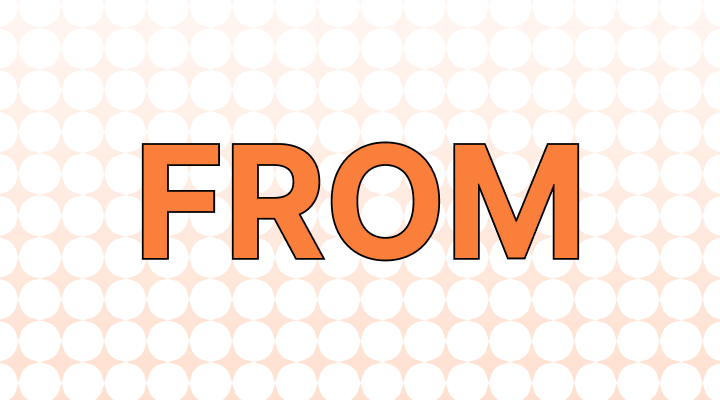In the context of a preposition, "from" indicates the point of origin or starting point of an action or movement. It answers the question "where from?"

Other meanings of the preposition "from"
Origin or source
She received a gift from her friend.
In this context, "from" indicates the origin or source of the gift, showing where it came.
Fact: In these sentences, "from" is used to indicate the source or origin of the information or idea, not necessarily to convey a fact in itself.
For example:
✍️ "The information comes from a reliable source."
✍️ "The idea originated from a brainstorming session."
Protection: In these sentences, "from" is used to describe the source of protection (the umbrella or the construction materials) rather than inherently conveying a sense of protection on its own.
✍️ "She shielded herself from the rain with an umbrella."
✍️ "The house is constructed from materials that protect it from extreme weather."
Starting point
The train departs from New York.
Here, "from" indicates the starting point of the train's departure.
Separation
The bookshelf is separate from the desk.
In this case, "from" expresses the idea of separation, indicating that the bookshelf is not part of the desk.
Time of Origin
He has been working from dawn.
"From" here indicates the starting time of his work, emphasizing the origin in time.
Cause or Reason
The team won the game from sheer determination.
In this example, "from" suggests the cause or reason behind the team's victory.
Comparison
She differs from her sister in many ways.
"From" is used here to express the basis of comparison between two individuals.
Material
The table is made from oak.
In this case, "from" denotes the material from which the table is constructed.
Agent in Passive Constructions
The letter was sent from the president.
"From" can be used to indicate the agent or source in passive constructions.
Range
While "from" is not specifically used to denote a range on its own, it is often part of phrases or constructions that indicate a range. The idea of a range is more commonly conveyed through the use of words like "between," "from...to," or "in a range of."
Here is an example that involves the concept of a range:
"The temperature will vary from 20 to 30 degrees Celsius."
Here, "from...to" is used to express a range of temperatures.
Placement in a sentence
The word "from's" position in a sentence depends on its role in conveying the relationship between elements. Here are some common positions of "from" in a sentence:
At the Beginning:
- From New York, he traveled to Los Angeles.
Before a Noun or Pronoun:
- He received a letter from his friend.
- I bought a gift from the store.
Before a Gerund (Verb + -ing):
- She is recovering from falling.
- I'm tired from working all day.
Between Two Time Expressions:
- The meeting is scheduled from 2:00 PM to 4:00 PM.
- We will be away from Monday to Friday.
Indicating a Range:
- The temperature will be from 70 to 80 degrees.
After Adjectives:
- She is suffering from a cold.
- The decision is based on information from reliable sources.
Now that we have learned the ins and outs of the preposition "from." Let's put our learnings into practice.
Exercise 1: Identifying the Function of "From"
Read the sentences and identify the function of "from" in each case. Choose from the options below:
A. Origin or point of departure: Indicates where something comes from or starts.
B. Material or source: Identifies the material something is made from or the source of something.
C. Separation or distance: Shows that something is separated from something else or indicates a distance between two things.
D. Separation or distance: Shows that something is separated from something else or indicates a distance between two things.
E. Time period: Specifies the beginning point of a time period.
1. She received a gift from her friend.
2. The table is made from wood.
3. The train is departing from Platform 7.
4. He has been studying English from January.
5. The house is located from the beach.
Exercise 2: Rewrite the Sentences
Rewrite the sentences using "from" to express separation:
1. The thief took the money off the table.
2. They removed the furniture out of the room.
3. I took the lid off the box.
4. He pulled the plug out of the socket.
5. She wiped the tears off her face.
Exercise 1: Identifying the Function of "From"
- Origin or point of departure
- Material or source
- Origin or point of departure
- Time period
- Separation or distance
Exercise 2: Rewrite the Sentences
- The thief took the money from the table.
- They removed the furniture from the room.
- I took the lid from the box.
- He pulled the plug from the socket.
- She wiped the tears from her face.
Want to sound like a native speaker?
Engram’s AI-powered grammar checker makes your English sound like a native speaker’s, suggesting natural English expressions on top of fixing grammar, spelling, punctuation, word order, and vocabulary.

Reference:














